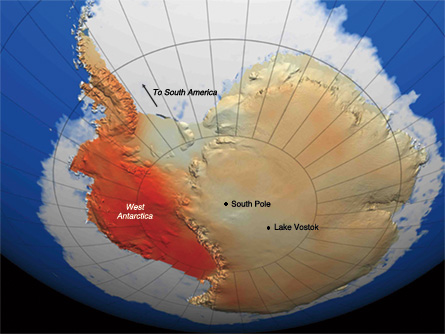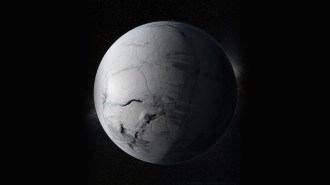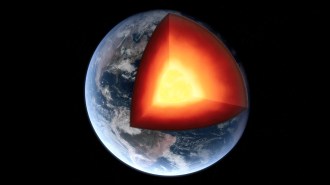Contrary to the findings of previous studies, much of Antarctica has warmed in recent decades — and it has done so substantially, at rates similar to the global average rise in temperature.

Most Antarctic weather stations, with the exception of those at the South Pole and Lake Vostok, lie along the coast of the forbidding continent, says Eric Steig, a climatologist at the University of Washington in Seattle. Although coastal regions, on average, have warmed in recent decades, weather stations at the South Pole and Lake Vostok in the continent’s interior — two data points that represent an area the size of the lower 48 United States — have cooled. “Lacking more data, scientists have presumed that most of the surrounding area was cooling as well,” says Steig.
Now, to assess long-term climate trends for the entire icy continent, Steig and his colleagues blended meteorological data from 42 weather stations available since 1957 with satellite data gathered since 1982.
The researchers report in the Jan. 22 Nature that most of Antarctica, like much of the rest of the world, has substantially warmed in recent decades.
The new findings suggest that “the West Antarctic Ice Sheet is more vulnerable [to warming] than we had previously thought,” says Drew Shindell, a climatologist at the NASA Goddard Institute for Space Studies in New York City and coauthor of the new study.
The team’s analyses also reveal that a small region of East Antarctica, a swath that includes weather stations at the South Pole and Lake Vostok that are far from the coast, indeed cooled slightly between 1957 and 2006.
But overall, East Antarctica as a whole — an area that accounts for about three-quarters of the continent and that has an average elevation around 3,000 meters — warmed about 0.1 degrees Celsius during that same interval. For comparison, global average temperature has risen about 0.6 degrees Celsius, or around 0.12 degrees per decade, since 1957, says Shindell.
The largest rate of warming revealed in the new study, however, showed up in West Antarctica, where the average elevation is only about 1,800 meters. In this smaller area, the average temperature rose about 0.17 degrees Celsius per decade from 1957 to 2006. The region’s Antarctic Peninsula — a finger of land that points toward South America and the place many scientists believed the continent’s warming to be concentrated — has warmed more slowly, only 0.11 degrees Celsius per decade since 1957.
West Antarctica’s warming has happened recently, the researchers speculate, in large part because sea-ice coverage off this region’s coast has dropped significantly in the last 25 years. That, in turn, has buffeted the region with storms carrying warm winds, Shindell says. Satellite data indicate that small patches of snow atop the West Antarctic ice sheet have melted briefly in recent years, Steig notes.
“The new results, and especially their spatial and seasonal patterns, indicate that there’s warming related to greenhouse gases on all seven of Earth’s continents,” Shindell says.
“This study makes an incremental contribution to a growing body of work that suggests that Antarctic climate is being influenced by humans,” agrees Andrew Monaghan, an atmospheric scientist at the National Center for Atmospheric Research in Boulder, Colo.
Strong warming in West Antarctica “is a particularly important finding,” Monaghan adds: Many field studies in that Greenland-sized chunk of the continent have noted the acceleration of large glaciers in recent years. While some scientists have attributed that speed-up to ocean warmth at the seaward end of those ice streams, the new findings suggest that atmospheric warming may be contributing to the acceleration as well.







